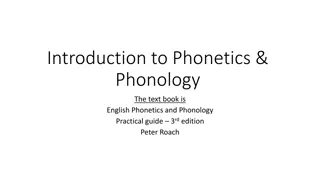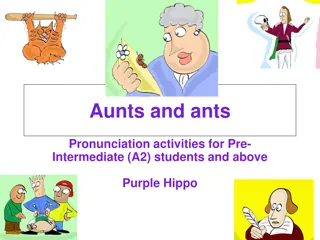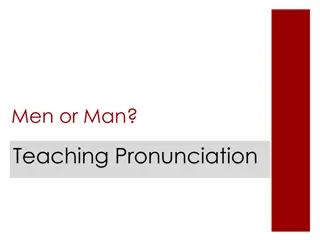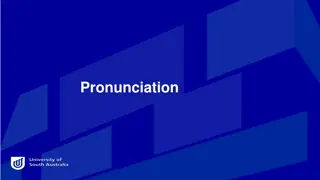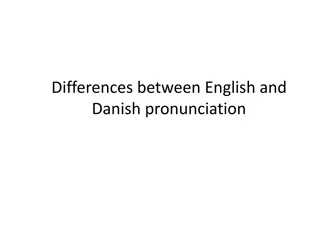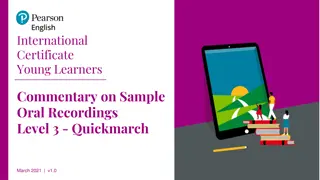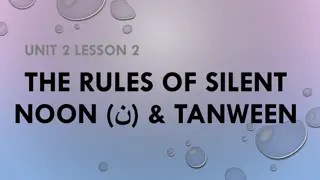Lesson 46 - Voiced "th" Sound Pronunciation Practice
Enhance your pronunciation skills with this lesson on producing the voiced "th" sound. Through a series of interactive exercises and visual aids, you will learn to correctly articulate this challenging sound, improving your overall spoken English proficiency.
3 views • 80 slides
Short I Advanced Lesson: Improve Your Pronunciation Skills
Enhance your pronunciation skills with the Short I Advanced lesson. Dive into various exercises and practice sessions to perfect the sound of the short I vowel. Explore interactive slides covering different aspects of the lesson, from basic concepts to advanced techniques. By the end of this lesson,
0 views • 88 slides
Advanced Lesson on Short U Sound Pronunciation
In this advanced lesson, you will delve deep into mastering the pronunciation of the short U sound. Explore various challenging words and practice exercises to refine your accent and fluency. Enhance your speaking skills with targeted guidance and expert tips provided in this comprehensive lesson.
0 views • 88 slides
Lesson 61: Pronunciation of "ge" and "j
Explore the pronunciation of the sounds "ge" and "j" in Lesson 61. This lesson covers the correct articulation and practice exercises to improve your pronunciation skills. Enhance your language proficiency with engaging slides and visuals that make learning enjoyable and effective.
0 views • 78 slides
Advanced Lesson on Short 'e' Sound Pronunciation
In this advanced lesson, you will delve deep into mastering the pronunciation of the short 'e' sound. The detailed slides provide examples, exercises, and tips to help you perfect this challenging vowel sound. By the end of the lesson, you will have a much clearer understanding and improved ability
0 views • 87 slides
Stress in English Pronunciation
Stress in English pronunciation refers to the emphasis placed on specific syllables within words. This helps distinguish degrees of emphasis or contrast in syllables, aiding in clear communication and word recognition. Learning about stress patterns is crucial for effective English communication. Th
1 views • 27 slides
Lesson 35A Short A Review: Enhancing Pronunciation Skills
Explore Lesson 35A Short A Review through a series of engaging slides. Discover strategies and tips to improve your pronunciation skills. Dive into various exercises and activities designed to help you master the short A sound effectively.
0 views • 71 slides
Normative Accents in English: RP and GenAm Overview
Normative English accents, Received Pronunciation (RP) and General American (GenAm), serve as reference points for English learners and speakers globally. RP is associated with the British elite and institutions, while GenAm represents a regionless form of American pronunciation. Both accents, spoke
2 views • 22 slides
English Pronunciation Class Activities and Examples
This class session covers various pronunciation activities and examples related to sibilant consonants, voiced and voiceless consonants, and conjugation patterns of verbs ending in -s, -z, -ch, -sh, -t sounds. It also includes exercises with verbs ending in -ed for pronunciation practice.
0 views • 6 slides
Practical Guide to Enhance English Pronunciation Skills
Learning phonetics and phonology is crucial for foreign students of English to improve pronunciation. This guide provides practical tips, such as choosing an English accent, breaking down words into sounds, speaking slowly, and imitating English speakers to enhance pronunciation skills effectively.
0 views • 12 slides
Phonetics and Phonology in Linguistics
Phonetics and phonology are two essential fields in linguistics that focus on speech sounds in language. Phonetics involves the objective analysis of speech sounds, while phonology explores how these sounds form patterns in specific languages. Pronunciation problems often arise due to habit interfer
1 views • 56 slides
Engaging Pronunciation Activities for Pre-Intermediate Students and Above
Engage your students with fun pronunciation activities centered around the themes of aunts, ants, cats, and baseball. From tongue twisters to playful rhymes, these activities are designed to improve pronunciation skills in an enjoyable way. Incorporating tongue twisters and rhymes featuring aunts, a
0 views • 12 slides
Phonetics and Phonology: A Focus on American English Sounds for Brazilian Learners
This session reviews key aspects of phonetics and phonology, specifically focusing on segmentals and suprasegmentals of English, with an emphasis on the pronunciation of American English sounds. The goal is to help Brazilian learners improve their pronunciation skills to sound more native-like. Topi
1 views • 18 slides
The Great Vowel Shift: A Linguistic Evolution
The Great Vowel Shift was a significant phonological transformation in the English language during the 15th to 17th centuries that altered the pronunciation of long vowel sounds. This shift, marked by a movement of vowel sounds to higher and more forward positions in the mouth, shaped the transition
3 views • 11 slides
Effective Techniques for Teaching Pronunciation in English
Explore issues in teaching pronunciation such as overemphasis on native-like pronunciation, the influence of native language on second language acquisition, precision versus intelligibility, and various teaching methods. Gain insights on common pronunciation problems, techniques for improvement, and
0 views • 29 slides
French Pronunciation Guide: Vowels, Nasal Sounds & Consonants
Explore the intricacies of French pronunciation through the International Phonetic Alphabet (IPA), understanding vowel sounds, nasal vowels, and consonant variations. Master the differences in sound production and learn how to correctly pronounce French words with detailed explanations and visual ai
2 views • 18 slides
Improve Your Pronunciation Skills Workshop
Enhance your pronunciation by focusing on pausing, chunking, word stress, and phonemic sounds. Understand why proper pronunciation is crucial to avoid miscommunication. Engage in activities like reading poems aloud and practicing word pronunciations. Utilize online resources for pronunciation improv
1 views • 16 slides
Stress in Compound Words for English Pronunciation
Explore the rules of stress placement in compound words in English pronunciation. Learn how stress can shift based on word combinations and types. Discover the differences in pronunciation between compound words, adjectives, nouns, and verbs for accurate spoken English.
0 views • 4 slides
Teaching Pronunciation Techniques and Drills for Effective Learning
Explore teaching techniques and drills for pronunciation focusing on activities like awareness exercises, games, and drills based on minimal pairs. Emphasizing the importance of physical activities in developing muscular flexibility for better pronunciation skills.
1 views • 25 slides
English as a Lingua Franca and Pronunciation Teaching
This session explores English as a Lingua Franca (ELF) and the importance of focusing on mutual intelligibility in English pronunciation teaching. It discusses the sociolinguistic context of L2 speakers interacting with each other, emphasizing the need for tailored pronunciation models. The session
0 views • 18 slides
Insights on English Pronunciation Variations and Intelligibility in Language Teaching
Dive into the nuances of vowel articulations and consonant recommendations in English pronunciation. Explore the concept of Lingua Franca Core vowels and how variations among L1 English speakers impact intelligibility. Understand the importance of mutual intelligibility in non-native speaker communi
2 views • 15 slides
EFL Teachers' Subjective Theories on Pronunciation Training
This study delves into EFL teachers' subjective theories regarding pronunciation training, with a focus on Internet-supported practices. Through semi-structured interviews, 11 high school EFL teachers shared their views and attitudes on the importance of pronunciation training in EFL classrooms, as
1 views • 13 slides
PA Dutch 101: Alphabet, Pronunciation, and Words Spelling
Learn the Pennsylvania Dutch alphabet, pronunciation guide, and how to spell words like Distelfink, Bottboi, and Wunnerfitz. Practice pronouncing words like Aag, Baer, and Gees in this informative video series.
0 views • 7 slides
The Pronunciation of the Vowel "i" in French
The French vowel "i" has two pronunciations, similar to the English sounds in "feet" and "yes." The first pronunciation involves spreading the lips and raising the tongue close to the front of the mouth, creating a high front vowel sound. The second pronunciation occurs when "i" is followed by anoth
0 views • 6 slides
Engaging Pronunciation Activities for Language Learners
Engage language learners with activities like shadow reading, tongue twisters, and "Have You Ever..." to improve pronunciation, stress, and intonation. These interactive tasks involve listening, speaking, and group participation, making the learning process challenging and enjoyable at any level. By
0 views • 14 slides
English Grammar Exercises and Pronunciation Practice
Enhance your English language skills with a variety of exercises including verb conjugation, sentence completion, sentence correction, and vowel pronunciation. Practice using the verb "to be" in different tenses, complete sentences by matching phrases, choose the correct form of sentences in past an
0 views • 5 slides
Fun Activities for Practicing Pronunciation with "Hull" and "Who'll
Engage in entertaining activities to improve your pronunciation using words like "Hull" and "Who'll" along with a colorful Purple Hippo. Explore a whimsical journey to Hull involving ghouls, owls, gulls, and more, all while enhancing your language skills.
0 views • 11 slides
Unit 11 - Careers in Pronunciation & Communication
Explore the world of careers in Unit 11 of Pronunciation & Communication with engaging warm-up tongue twisters, listening exercises, and communication tips for job seekers. Discover the qualities needed for diverse professions such as Diving Instructor and Commercial Pilot. Sharpen your language ski
0 views • 14 slides
English Pronunciation and Phonetics
Pronunciation in English refers to the way words are spoken, distinct from accent. We aim to learn Received Pronunciation, the standard British English accent. The science of studying pronunciation is phonetics, which focuses on speech sounds and their classification. English has 44 unique sounds re
2 views • 9 slides
Learn Welsh Alphabet and Pronunciation
Explore the Welsh alphabet, vowels, pronunciation rules, and common names in Wales. Discover the unique characteristics of the Welsh language, including circumflex accents and double letters. Improve your ability to recognize letters, pronounce words, and identify places and colors in Welsh.
0 views • 14 slides
Common Pronunciation Challenges in Spanish for English Speakers
Pronunciation challenges for English speakers learning Spanish include the addition of schwa sound, substitution of Spanish letters, confusion between /i/ and /ɪ/, omitting vowels before consonants, and issues with pronouncing /m/, /n/, and /r/. These challenges can affect the intelligibility and f
0 views • 11 slides
Pronunciation Contrasts Between English and Danish
Explore the key differences in pronunciation between English and Danish, focusing on stops, affricates, and basic advice for improving vowel sounds. Understand the importance of correctly pronouncing sounds to avoid misunderstandings. Practice sentences highlighting pronunciation variations in both
0 views • 15 slides
Guidelines for Assessing International Certificate Young Learners Oral Tests - Level 3
This document provides guidance on assessing International Certificate Young Learners' oral performance at Level 3. It includes criteria for assessment related to grammar, vocabulary usage, and pronunciation, with detailed descriptions and scoring for each level of proficiency. Test takers are evalu
0 views • 18 slides
Overview of Fricative Sounds in English Pronunciation
This content discusses various fricative sounds in English pronunciation, focusing on the articulation of sounds like /s/ and /z/. It covers the positioning of the soft palate, tongue, teeth, and lips while producing these sounds, providing examples like "thin," "think," "free," and more. The conten
1 views • 11 slides
Rules of Silent Noon and Tanween in Arabic Language
Learn about the rules of silent noon and tanween in Arabic language, including their pronunciation, position in words, and types of words in which they occur. Silent noon remains unchanged in writing and pronunciation, while tanween doesn't appear in writing when stopping. Understanding these rules
0 views • 5 slides
Effective Pronunciation Activities for EAP Learners
Explore innovative pronunciation activities for EAP learners focusing on diphthongs and nuclear stress. Discover strategies to contrast sounds across languages, provide visual cues, and integrate nuclear stress training into assessment preparation. Utilize methods like correction through non-verbal
0 views • 8 slides
French Pronunciation and Introductions
Learn how to pronounce French phrases with a good accent, understand basic pronunciation tips, master intonation in asking questions in French, and practice introducing yourself and others with common phrases. Improve your French pronunciation skills and confidently engage in introductory conversati
0 views • 14 slides
Phonological Interference in French BIPA Students: A Literature Study
BIPA students face challenges in pronunciation due to phonological interference, especially in French-speaking students. This study explores the linguistic aspects contributing to pronunciation errors and proposes phonetic corrections. Literature review discusses language interference and factors in
0 views • 11 slides
German Pronunciation Practice with Letter Combinations
Dive into the world of German pronunciation with this interactive lesson focusing on letter combinations "shp" and "sht". Practice sounds, words, and even a tongue twister to improve your spoken German skills. Get ready to master the pronunciation of words like "Spitzbart" and "Sterne" with engaging
0 views • 9 slides
The Rules of Ikhfaa in Recitation
Ikhfaa is a crucial concept in Quranic recitation where the pronunciation of certain letters is concealed or nasalized. It involves hiding the sound of Noon Sakinah or Tanween and prolonging it subtly. This guide illustrates the 15 letters that undergo Ikhfaa, explaining the real essence of this sil
0 views • 14 slides









